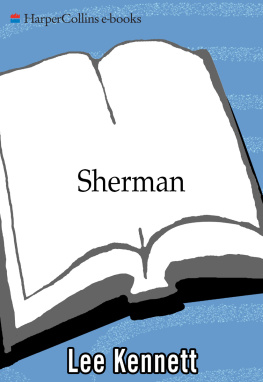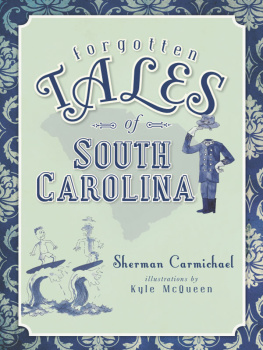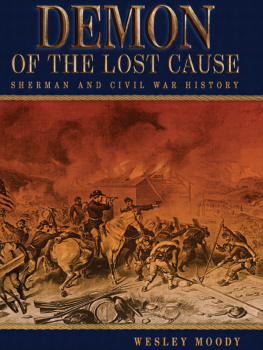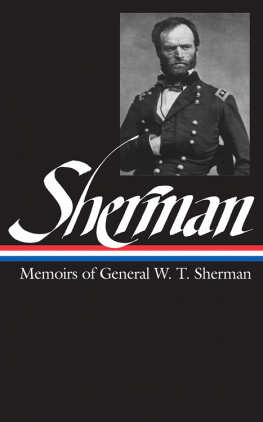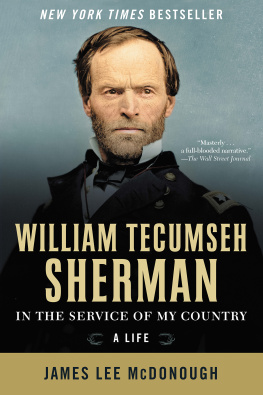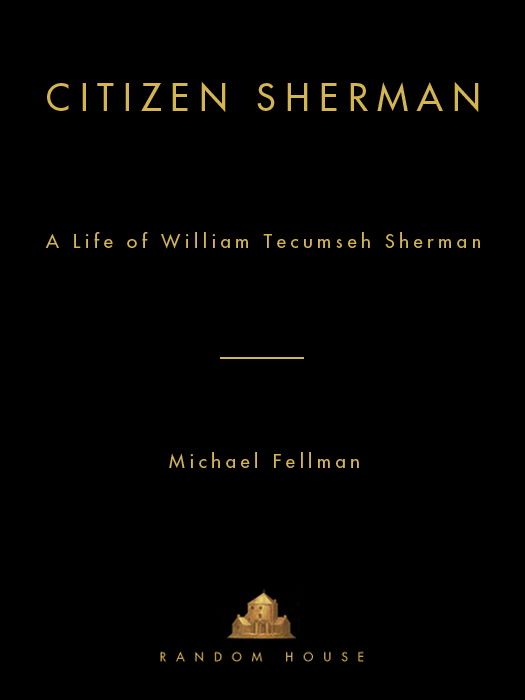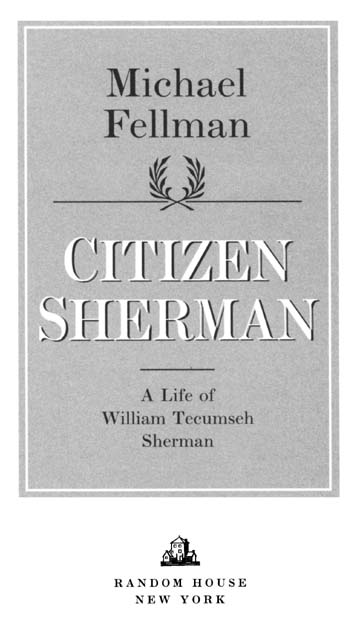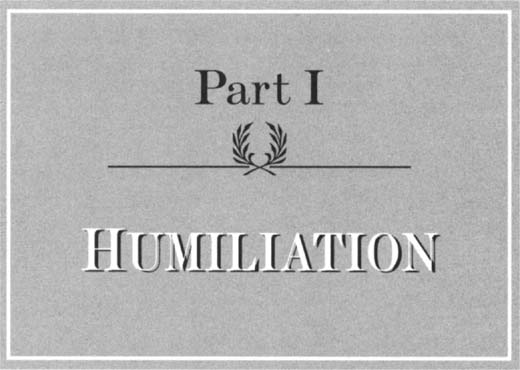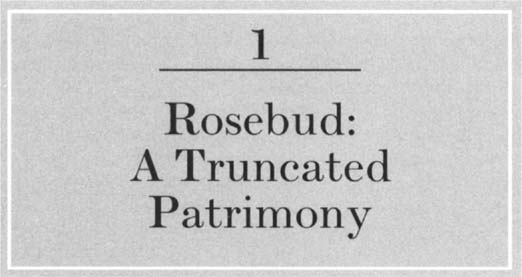Copyright 1995 by Michael Fellman
All rights reserved under International and Pan-American Copyright Conventions. Published in the United States by Random House, Inc., New York, and simultaneously in Canada by Random House of Canada Limited, Toronto.
Library of Congress Cataloging-in-Publication Data
Fellman, Michael.
Citizen Sherman: a life of William Tecumseh Sherman / Michael Fellman.
p. cm.
Includes bibliographical references.
eISBN: 978-0-307-82769-2
1. Sherman, William T. (William Tecumseh), 18201891.
2. GeneralsUnited StatesBiography. 3. United States. ArmyBiography. I. Title.
E467.1.S55F45 1995 355.0092dc20 94-41087
[B]
v3.1
Preface

T his book had its genesis many years ago when I read, in his 1875 memoirs, William T. Sherman describing his motivations for undertaking the March to the Sea, which ravaged Georgia in the hot summer of 1864. My aim then was to whip the rebels, to humble their pride, to follow them to their inmost recesses, and make them fear and dread us. For rage, ruthlessness, cold psychological calculation, and clarity of expression, no American military figure has equalled Shermans statement.
After living with him for many years now, I am more convinced than when I began that Shermans statement was utterly authentic. This was not merely powerful rhetoric, but deeply felt and intentionally expressed anger. This was a warrior, and his enemies knew it. My primary tasks are to understand the origins and shaping, both personal and cultural, of this man; to set his profoundly important Civil War leadership in emotional as well as in social, intellectual, and ideological contexts; and to place his military activities in the far broader webs of the experience of a long life, one that was tumultuous for all his seventy-one years and not merely for the four years of the Civil War.
As it happens, far more of this life can be recovered than is usually the case for historians. Sherman was voluble; in letters as in speech, he rarely kept his thoughts or feelings hidden. And because he was so famous, nearly everyone kept his letters, while archivists have solicited them eagerly ever since his death in 1891. Particularly rich are the family papers, where one can find the residue of a long and deeply stressful marriage. Sherman lived apart from Ellen Ewing Sherman for at least half of their marriage, and they wrote every three or four days, holding nothing back, particularly their angry feelings. In addition, Sherman corresponded with each of his children, and so one can retrieve the hopes and disappointments of Sherman as husband and as father of a big family. Beyond them, Sherman must have had one of the widest circles of friends and acquaintances of any public man of his time, and here too his letters document not merely his career but his expressive emotional life with a vast array of women as well as men.
Taking these sources together one can reconstruct not just a general but a man, a famous and furious man, in all the stages of an endlessly restless life, from humiliating youth and younger manhood, through personal transformation during the Civil War, to a later life lived in great fame. He was always vivid and dramatic, self-absorbed and gregarious, depressed and elated, opinionated and fearful, searching and bigoted, repellent and charming. And his was a life that made an important impact on American history; his values, both military and social, made a difference.
This book studies the origins of Shermans rage, its applications and complex moral meanings. It also examines the building of a mid-nineteenth-century mans life, private and public together, personal characteristics expressed in social and antisocial activities, the general in the citizen, the American as a man of war.
W riting seems a solitary activity, but it is also social, and I wish here to acknowledge many institutions and friends who have helped me along the way. The Social Sciences and Humanities Council of Canada provided a major grant, which speeded completion of the research for this book. For the year 199293, I was fortunate to receive a Marta Sutton Weeks Senior Research Fellowship at the Stanford Humanities Center. I am most grateful to Wanda Corn, director of the Center; to Charles Junkerman, associate director; and to Susan Sebbard, Sue Dambrau, and Margaret Seligson, for many acts of thoughtfulness, not the least of which was the use of a beautiful and appropriately Victorian office. The Huntington Library also made me a fellow during my period of research, for which I owe special thanks to Martin Ridge. Deans Robert C. Brown and Evan Alderson of Simon Fraser University provided timely aid in many ways. James Dobbie and Scott Perchall were energetic and attentive research assistants.
My fellow fellows at the Stanford Humanities Center, especially Marleen Rozemond, Stephanie Lysyk, Theodore Andersson, Roland Greene, Colin Palmer, Lyman Van Slyke, and Harry Harootunian, were boon companions who heard far more about General William T. Sherman than they could possibly have anticipated. Much the same can be said of several colleagues in the History Department at Simon Fraser, notably Hannah Gay, Andrea Tone, Paul Dutton, Richard K. Debo, and Ian Dyck.
Several friends generously took the time to read my work. Leon Litwack and Charles Junkerman read portions, while Stephanie Cole, Christopher Morris, Rick Henderson, and Edward C. Coffman read the whole manuscript, much to my edification. As always Robert H. Wiebe gave me the kind of brilliant analysis that first took my breath away and then put me back to work. My persuasive and tactful agent, Bella Pomer, opened the right doors. At Random House, my legendary editor, Robert D. Loomis, gave me the benefit of his good cheer and thoughtfulness as well as that of his very sharp pencil. My two sons, Joshua and Eli, have not read a word of this book yet, but they encouraged me in many more important ways. My father, David Fellman, my late mother, Sara Dinion Fellman, and my sister, Laura Fellman, supported me in this project, as they always have. Finally, my wife, Santa Aloi, listened to the first draft of this book with her artists eye and ear. For this, and far more for all the caring and loving, I dedicate this book to her.
Vancouver, British Columbia
March 6, 1995
Contents

N ormally the most garrulous and self-revelatory of men, William Tecumseh Sherman had curiously little to say about his boyhood. Indeed, in his Memoirs, published in 1875, the fifty-five-year-old autobiographer opens his story in 1846, when he was already well launched in his career as a first lieutenant of Company G, Third Artillery, United States Army, stationed at Fort Moultrie, South Carolina, from where he soon was to be reassigned to California.


